#fullmetal alchemist meta
Explore tagged Tumblr posts
Text
I don't think Ed could have run from Scar after Scar destroyed his automail.
Not only would he have to adjust his balance to suddenly not having that weight on one side, he also seemed to be very out of it.
The arm being suddenly destroyed was a serious disruption to his system, even if it didn't hurt (which it probably did.) I don't think Ed had the coordination to get up and run away again.
13 notes
·
View notes
Text
My hot take is
Fullmetal Alchemist had wayyyy too many visual gags and most of them were unnecessary. At worst they cheapened the emotional impact of the scene. Looking at you, Havoc/Mustang/Lust battle.
2 notes
·
View notes
Text
Sorry for the spoilers but this is really good analysis…..
I’m glad Maes Hughes died.
He’s a fan favorite character and I enjoy him a lot too, but I think fundamentally he’s a character who has to die. His role in the narrative is to haunt it.
I might be even more of a weirdo because I enjoy his manga characterization over his Brotherhood or ‘03 portrayal, but I love the idea of Hughes being someone the Elric brothers barely know - someone we, the audience, barely see.
Until he dies.
Because suddenly he’s everywhere. He was Roy’s friend and Armstrong’s superior officer and Winry’s acquaintance and Elicia’s father - and he was the soldier both Ed and Al knew, but didn’t actually know, that got killed because of them anyway.
In the manga Winry stays at Hughes’ place, but Ed and Al enter his house for the first time after they found out he died. For them, it’s not about losing a friend (though I am sure they liked him just fine) because that story is already Roy’s - for them it’s about realizing that this plot they’ve involved themselves in kills people that aren’t actually directly involved at all to begin with. It makes sense for their allies and friends and loved-ones to be targeted by the antagonists - but a soldier who mostly joined in because he was at the right (or wrong) place at the right (wrong) time? That’s not supposed to happen. And that’s what makes Hughes’ death so hard on them.
(and poor Elicia - abandoned children without their fathers were always a weakness of Ed’s)
But Roy? Yeah… he suffers. From the moment of Hughes’ dead on, Roy is haunted by it. By him. His best friend follows him everywhere. We see it in the way Roy only involves himself in the plot because Hughes figured something out and Roy is desperate for answers. He hunts down the homunculi to save this country, sure, but mostly so he can burn his best friend’s murderer to the ground. When Riza talks about winning against the Führer and their military dictatorship, she talks about all of them, not a hint of revenge coloring her vision - but Roy? It is telling that it isn’t a greater ideal that makes him torture Envy, but the agony of his best friend’s death.
The thing that almost breaks Roy is Maes.
No.
It’s Maes’ memory haunting the narrative.
And isn’t that beautiful?
The tragedy of it all, the horror, and the realization that Roy Mustang never really recovered from the War, that his friends are the only think keeping him in one piece, the fact that Roy Mustang is a Hero and a Monster and a fallible human capable of love.
Maes Hughes has to die to remind all of us of what Roy Mustang is capable of: love, loyalty, devotion…. and the slaughter and torture of numerous people.
His ghost is haunting the narrative - and for that I love him.
#fma#fmab#spoilers#roy mustang#maes hughes#fullmetal alchemist brotherhood#fullmetal alchemist meta#maes is also a war criminal#just want to point that out#and in contrast to roy not even one with a whole lot of morals#just fyi#this is a pretty idea though#fma spoilers
3K notes
·
View notes
Text
infuriating that it's been 15+ years and so many people still get Roy killing Lust wrong
"it's ironic that Lust was killed by a womanizer" "Lust was killed by a man who lusted after power" NO! Lust was killed by a man who did it because of love.
It's ironic that she was killed by a man who uses his (false!) public reputation as a womanizer to conceal the fact that he is one of the most steadfastly loyal people in Amestris. It's ironic she was killed by someone whose entire motivation revolved around gaining the power to help others. It's ironic that he killed her for threatening his people.
Lust was killed because Roy refused to let Havoc die, because he refused to let Riza throw away her life. He killed her because he refused to die without making sure the people he loved were safe. Lust was killed because of love. That was the point.
9K notes
·
View notes
Text
I know it's kind of exaggerated as a joke to say that FMA ends with Ed "punching God" but it's actually really thematically important that Father is not, actually, a God
for all his power, for all of the souls he sacrifices to create Philosopher's Stones, he can never actually achieve Godhood and that's the point
in fact one of the BIGGEST themes in FMA is how ultimately impossible and also disastrous it is for mortal beings to play God, whether that comes in the form of trying to reverse death, using alchemy to experiment with and twist human beings, or seeking immortality
Ed and Al trying to reverse the natural process of death, Father Cornello making himself a god in the eyes of his followers, Shou Tucker playing with his daughter's life in the name of creating a new creature, the attempt to create life leads to the main villains of the series, the king of Xerxes's search for immortality leading to the destruction of his nation, Father's plan to create more Philsopher's stones leading to constant bloodshed, the implication that the emperor of Xing's search for immortality could do the same to Xing, etc. etc. etc.
every single character that tries to play God faces consequences - either for themselves or for others - and Ed is only able to reverse his and Al's consequences because he finally recognizes that alchemy can't ever make him more than human. "Well done, Edward Elric," Truth says after he expresses this - as a direct opposition to his introduction in the Cornello arc, in which he claims that alchemists are the closest thing there is to God
and Father goes through the exact opposite. Father ultimately doesn't fall to Ed but to Truth, because he NEVER gives up his arrogance, and Truth punishes him for it.
2K notes
·
View notes
Text
I noticed something interesting about the final battle against Father in Fullmetal Alchemist (the manga and Brotherhood). Late in the battle, when Father's starting to wear down, he goes after Ed specifically to try to take Ed's soul for a stone, out of everyone else present.
We saw earlier in the final battle that Father didn't have much of a problem taking the souls of other people, though the fact that Ed was pinned down might've made him an easier target. On the other hand, something about Ed made him a more attractive target to Father when previously he was taking the souls from Briggs soldiers. Was it something to do with the way Ed utilized himself as a philosopher's stone previously, and/or weaponized his soul to defeat Pride?
On top of that, Ed's soul is still a worthwhile target for Father, even though Ed has used it as a stone before. Maybe this is a self-answering question, but just how much is Ed's soul specifically worth?!
#fullmetal alchemist brotherhood spoilers#fullmetal alchemist meta#fmab spoilers#fullmetal alchemist spoilers#fma spoilers
5 notes
·
View notes
Photo
Actually coming back to this! Armstrong fights like this. He's probably the one who taught Ed. (Though I'm still holding out for boxer!Breda. Listen that man needs more love)

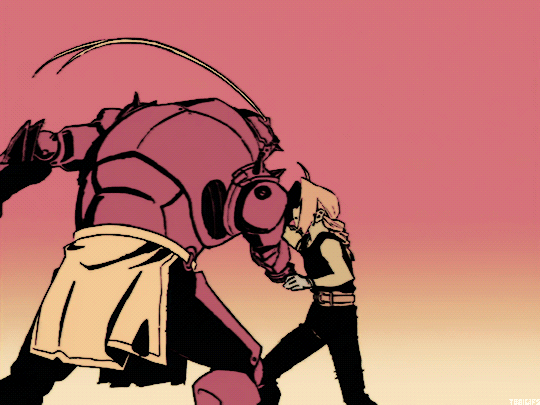
28K notes
·
View notes
Text
I don't know if this is common knowledge, but all of team Mustang's codenames are borrowed from girls working at Madame Christmas' bar.

This is Vanessa, the girl whose name was assigned to Falman.
That means there's an actual Elizabeth — with whom Roy would talk to over the phone, and go on "dates" with — who is not Riza. That's exactly what makes the codenames effective. At any point Roy can just go on that fishing trip with the real Elizabeth to throw off anyone suspicious.
Also, all the selected girls' names share one or more of the Japanese syllables (kana character) with the person they have been assigned to:
Name (Japanese spelling)
Riza (ri-za) = Elizabeth (e-ri-za-be-su)
Jean (jya-n) = Jacqueline (jya-ku-ri-i-n)
Breda (bu-re-da) = Braidykins (bu-re-i-di-ki-n-su)
Vato (va-to) = Vanessa (va-ne-s-sa)
Kain (ke-i-n) = Kate (ke-i-to)
Poor Breda is the only one whose codename is related to his last name instead of his first name.
222 notes
·
View notes
Text
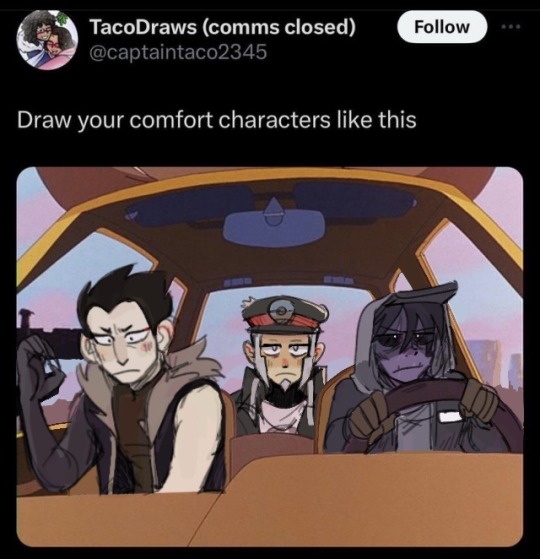
happy new year. im sleepy and this made me laugh.
orginal below cut:

#art#doodles#meta talks#ingo submas#greed fmab#michael afton#memes#jokes#fnaf#digital art#five nights at freddy's#pokemon#fullmetal alchemist brotherhood
947 notes
·
View notes
Text

As an avid fan of Fullmetal Alchemist for nearly twelve years, I am intrigued by how differently the story hits me as an adult.
As a kid, it was a story about alchemy and homunculi and defeating the literal, physical evil of false humans named after the seven deadly sins.
Looking back as an adult, I am cognizant of the overt fascism present in the government of Amestris.
The fictional Ishvalan war was awful from any angle, but as a kid I saw it mainly as a backstory for character development. In the modern day, with all of the daily horrors shared from Gaza, I am striken by the reality of those scenes.
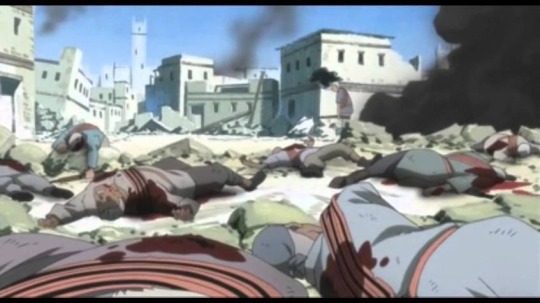

This show was one of the ways I processed my understanding of the world as a kid, and it is deeply engrained into my personality.
I say this to preface the horror I feel looking back on these scenes which were drawn from the author's culture, and the history of the Ainu Genocide.
I think of that panel of Major Armstrong crying and holding the body of a child, the panels showing piles of bodies barely covered by white sheets. And I see those same images in photos and videos from now.
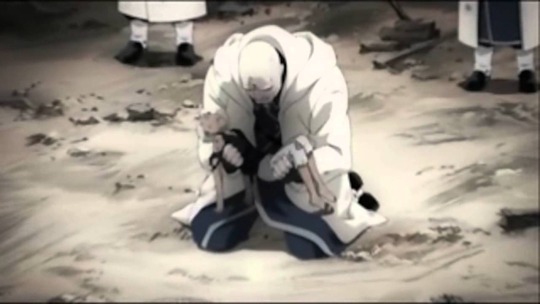
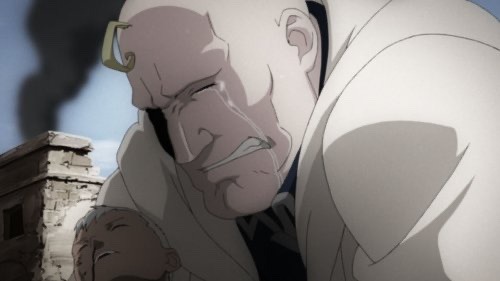
In the same vein, I remember the discomfort I felt as a kid discovering that in the context of our world Maes Hughes, a lovable and popular character, would have been a Nazi, as depicted in the Conqueror of Shamballa.
At the time it was almost a joke, to say to friends who loved him "hey he's a Nazi in this movie!" and laugh at their surprise.
But as an adult, I understand why. The adults in this story are members of a fascist, militant government. They are lied to and manipulated, yes, but they also uphold the system. The important part though is that they come to realize this.
They look at Ed and Al, these young hopeful teenagers who are one bad day away from being coerced into enacting war crimes, and they do their research. They realize that the government is fucked up, and stage a coup.
Aside from all of the fantastical alchemic elements, it is a wonderfully grounded story that is painfully reflective of both historical and modern systems of corrupt power.
#fullmetal alchimist brotherhood#fullmetal alchemist#fma#fmab#free palestine#free gaza#genocide#fma meta#fma analysis#fma fanart#fmab fanart#writing#jess’s art
224 notes
·
View notes
Note
What other anime in recent memory ended with a coup, where the existing power system was directly challenged? Mustang et al literally overthrew the evil corrupt government and Arakawa was so real for that.
Recently I've heard some people don't like how FMA handles fascism or more like how it handles the characters affected by it or the characters who are working for the state. That it's anti-radical, liberal centrist jargon. I think it's still pretty good though and one of my all time faves, even if couple things I would have done a bit differently
I would not have done anything differently.
Audiences today want Marvel movies where the heroes and villains are announced at the beginning. They want good and evil with no nuance. They want righteous revolutionaries who are 100% ideologically and politically perfect. They want heroes who only use violence in a way that the narrative frames as wonderful and liberating.
Fullmetal Alchemist does not deliver that.
Colonel Mustang is a war criminal. The story never apologizes for his war crimes. Those crimes are there on his resume and they are never scrubbed away. He even manipulates and recruits two child soldiers. So audiences don't like that he orchestrates a revolution against the fascist shadow government. They didn't want him to be the one to do that because he's not a character that you can romanticize.
Scar's cause was righteous. But his terrorism was completely ineffective and did not help his people. He became obsessed with murdering a child soldier while neglecting the needs of Ishvalans. The fascist shadow government actually helped Scar because they wanted to kill powerful and disloyal alchemists. Scar could do that for them. His terrorism was useful to the very forces he was fighting against. Obviously, audiences who want righteous radical revolution stories are not going to like that.
Amestris's revolution is eventually carried out by a collection of people who were once on several opposing sides. And internet leftists don't like that because of course they don't.
548 notes
·
View notes
Text
Nothing makes me as feral as the realization that one of Roy's worst moments was burning the tattoo off Riza's back (considering he didn't even manage to burn all of it off), while Riza probably considers that to be the kindest thing Roy has ever done for her.
Her screams of pain and despair and agony haunting Roy just as much as the screams of those he killed, while Riza remembers her own tears fondly because they meant she was finally free of the physical burden of carrying that secret.
Riza asking to be mutilated and Roy doing it TO HER being the biggest gift he could have given her - and yet he will never forgive himself for marring her skin.
He has only ever burned, killed innocents, and learned to torture. He cannot understand that him doing the same to Riza - to his Lieutenant - was a blessing. Mercy. A show of goodwill.
But I think Riza understands. And I think, just as she considered putting an end to him out on the battlefield in Ishval, she takes comfort in him feeling guilty for something she asked him to do. Because it is a sign that he can feel guilty for what he has done - and it is payback for the guilt she suffered after giving him the secret to flame alchemy and him then using it for the slaughter of hundreds.
She can only ever remember that pain fondly - and he can only ever swallow down his guilt.
And I think a small, dark part of Riza likes that.
#royai#riza hawkeye#roy mustang#fma#fmab#fma brotherhood#fullmetal alchemist brotherhood#my stuff#fma meta#even if this is more of a headcanon#but everything i have ever said about royai#assumes this to be true#because they are both so mentally ill about each other#that roy's guilt and the fact that he did it anyway#is the biggest gift he could have given Riza#and her taking joy in the pain of her own mutilation (as a reclamation of her own agency)#is something so close to her heart#that she won't ever absolve Roy of that guilt#(not that he would let her)#because it belongs only to her#and her body has never belonged only to her
97 notes
·
View notes
Text
Someone probably already said something similar to this at some point, but I want to get this out myself: I feel like Roy and Riza not getting an on-screen happy resolution (and an obstacle in them getting it ever, though if they ultimately do is left to the audience's imagination) is not only not a flaw or something missing from the ending, but actually a good thing. Not because I don't like RoyAi - I do, but because it works thematically. This aspect I find interesting when contrasted with the other major couple in the series, Ed and Winry, who get about as definitive of a conclusion as you can get (and with the proposal scene, and the family photo in the montage - the EdWin "confirmation" is pretty much what caps off the series).
When Riza tells Ed about Ishval, and her and Roy's plan to have those who carried it out tried as war criminals, she tells him to not worry about them, but be more concerned about himself. Basically: "your hands aren't stained with blood, go and be happy, don't get bogged down by those like us whose are". And I think this sentiment applies to the romantic couples: Ed and Winry are innocent, and get to maintain that innocence throughout the story (Ed held on to his principles, primarily about not killing, Winry didn't pull that trigger), so we see them get the happy ending. Roy and Riza aren't innocent, so they don't get that conclusion. I even like to think that that's why in that conversation Riza so casually brings up Ed loving Winry. Maybe she's seeing herself and Roy in them, but unlike with herself there's nothing stopping them from finding happiness together, so she wants them to. I'm looking at this through a shipping lense, because I enjoy examining this aspect from that perspective, but honestly this applies to the ending overall. Ed accomplishes his goals, and through the final episode/chapter we definitively know that he and the people closest to him (like Al and Winry) pretty much get to live happily ever after. Roy by series end hasn't yet accomplished his goal of becoming Fuhrer, his romantic arc isn't resolved, there's still that "tried as war criminals” thing they're planning looming over. His ending is a lot more up in the air. Team Mustang not named Roy or Riza actually do get happy endings via photos, and sure enough those are the ones who didn't serve in Ishval.
#fma#fullmetal alchemist#fmab#fullmetal alchemist brotherhood#royai#edwin#roy mustang#riza hawkeye#edward elric#winry rockbell#fma meta#for the record this isn't me saying those who imagine/write fanfic about roy and riza getting a happy ending are wrong or missing the point#they're not#I'm stictly talking about how we canonially get a definitive happy conclusion for one group of characters#and the other's ending is uncertain and unresolved
101 notes
·
View notes
Text
List of Small Things™ I enjoy about Fullmetal Alchemist in no particular order
Everyone in FMAB/manga is just Some Guy™ and very human and I love that so here goes:
Falman getting stuck with a serial-killing suit of armor in his appartment for days and his reaction to it. It may have been weeks. He's been on sick leave the entire time. He's a guy in his early thirties with a flock of early-greying hair because being in a dead-end-role in the military is stressfull, ok. He gets stuck at home with a funny little serial killer (and eventually some foreign body guards, and a foreign prince?? lighting signal fires in his backyard?? like man what a week)
The whole military ambush against the Devil's Nest was yes, kind of kickstarted by the gang kidnapping Al for Greed, but it was mostly kickstarted because Ed was down south to do his yearly official report and Bradley and Armstrong just happened to be present when he was informed Al had gone missing. Greed's entire operation was done in by a teen doing his paperwork
on that note, Greed really decided to spend his immortality wisely by pursuing absolutely none of his supposed ambitions and just decided to settle down with a bunch of buddies. An offshot of the buddies he was initially made to guard, too. I don't think Greed is aware of this either
everyone on that radio building. The radio host 100% down to get some coup-shenanigans into his station to drive engagement. The guys sympathising with Mrs Bradley and taking care of her. Breda taking control of the narrative with a perpetual frown by the skin of his teeth.
I know the story of how the Bradleys met is technically not canon(?) but Mrs Bradley slapping her future husband upon their first meeting because he got his flirting tips from his siblings will never not be funny. Idiots. All of them.
EVERYTHING about Darius and Heinkel. They lost their jobs and became wanted criminals upon helping out some scrawny 15 year old. They have families they miss dearly. They haven't looked back since. "You guys don't HAVE to help me save the world" - "It's not like we have anything better to do"
i was going to say the Ice Cream Truck, because it's iconic, but actually, when told to disguise a vehicle, 15-year-old pinacle of edgelord fashion Edward Elric turned it into a colourful nightmare of spikes that barely resembled a car but might be closely related to the worlds deadliest parade float. None of this was necessary. Ed is just like that.
Hawkeye growing her hair out after meeting Winry, and Winry getting piercings after seeing Hawkeye's
Denny Brosh bursting into tears when he sees Maria Ross is still alive. Dude managed to not quit his job despite working in the same city (department?) where his best friend's killer was his supervisor. They were also very real for showing us that this is a guy who oversleeps and is older brother to at least three younger siblings. There was no need to give us more on Denny Brosh but every little detail hit so hard when they reunited.
okay so remember that time Ed and Ling ate Ed's shoe. Remember that Ed spend some time on a "deserted island" as a kid. Gluttony's stomach had nothing on him. Izumi raised some anime-ass boy-scouts. 100% Farm boy behaviour. These kids are so 15 it makes me want to bite things
immortal, soul-spliced dwarf in a flask got rid of his Sloth and still managed to procrastinate on his world domination plan until the last minute. Most Human disaster.
the entire half-episode they spend on Dr. Knox and his regrets and family. FMA is so good about humanising everyone.
everyone bullied Yoki because he was a small town fraud exploiting workers for his own benefit. Simply a jerk. He also hit Pride with a car in an epic rescue, and cried and screamed the whole way through
that one shot of a kid curiously poking a soldier they found bound on the ground with a stick
(I know it's technically not canon, but-) "I'm trying to save your life, asshole!"
Edward Elric
#fmab#fullmetal alchemist brotherhood#fma#fmab meta#of course there are more#'it's not like they have a tank or something- fuck'
1K notes
·
View notes
Photo
The fact that Mustang is (from what I can tell; it's been years since I watched this episode) about to salute, but he switches to a handshake, and then swaps to his left hand so that Edward can meet the shake with his natural hand. So Edward can feel it.
also so Edward doesn't feel bad about... whatever that is. Very gently slapping Mustang's hand away? Because it's done with his left and won't hurt.



Goodbye Fullmetal Goodbye General
682 notes
·
View notes
Text
I love Roy Mustang, because usually the "charming and morally ambiguous™" guy of the situation is that detached, cold, emotionally unavailable character who only shows his emotions in extreme circumstances. And then there is Roy, who is this pathetic moron who constantly picks fights with his 15-year-old employee and is useless on rainy days because his alchemy ,, does not work. And he is also this character who loves so fiercely that his affection for his loved ones is his greatest strength and also his greatest weakness. Roy does not want to rise to power because he desires power itself, but his ambition is dictated purely by a desire to establish a system in which people can protect each other so that he can in turn protect the people he loves.
The villains' way of neutralizing Roy the moment he becomes inconvenient is to dismember his team and place his subordinates in the four corners of the country and take his lieutenant hostage. What keeps Roy sane after Ishval are his friends - and also his plans, but mostly his friends. And when he collapses in Lab 3 after the fight with Lust, his first thought is to make sure Riza is all right and then send help for Havoc. When he re-emerges from the Gate and is blind, his first thought is to ask Riza how her injuries are. When he has a chance to recover his sight, he decides to do so only after Havoc is healed. Roy is absolutely destroyed by his best friend's death and he's consumed by the desire of revenge, and yet what stops him from crossing the line is the idea of losing the other person he loves the most.
Roy is an extremely complex character, a flawed man who has committed unspeakable horrors and unforgivable monstrous deeds and has paid dearly for his naiveté and idealism, yet that desire to protect people that drove him to enlist in the first place has never gone away and that's what keeps him moving forward. In Ishval he betrayed all his ideals, he betrayed himself, he betrayed Riza and the memory of his teacher and the very concept of alchemy in which he believed, but that part of him that wanted to protect people did not die. And when he comes back to East City and decides to start climbing the ranks, he hides his ambitions from his superiors basically by continuing to be the idiot and lazy and womanizer colonel who hates paperwork and dicks around in the office. And everyone falls for it, and meanwhile he quietly manages to become a freaking colonel at 29 !! I love this pathetic jerk so, so much.
#roy mustang#fullmetal alchimist brotherhood#fullmetal alchemist#fma#fma:b#fmab#meta#colonel idiot has my heart
2K notes
·
View notes